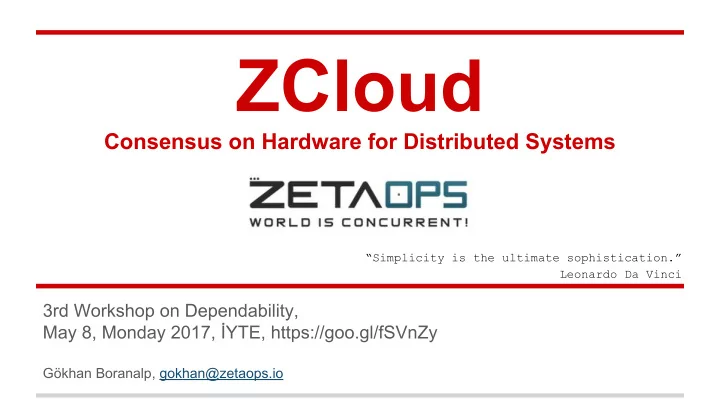

ZCloud Consensus on Hardware for Distributed Systems “Simplicity is the ultimate sophistication.” Leonardo Da Vinci 3rd Workshop on Dependability, May 8, Monday 2017, İYTE, https://goo.gl/fSVnZy Gökhan Boranalp, gokhan@zetaops.io
Road Map Problem Definition ➔ Our Solution ➔ ZCloud Components ➔ ZCloud Hardware ◆ ZCloud Cluster Management Tools ◆ ZCloud Protocol ◆ Benefits ➔ Similar Work ➔ Discussion ➔
Problem Definition Increasing, ➢ computing power, ➢ data storage, analysis and ➢ sophisticated network communication requirements in modern “data centers”, reveals the strong need for “distributed” operation for both networking devices and applications.
Problem Definition Apache Mesos and Google Kubernetes, which are using the container virtualization technique to develop, scale and manage applications in distributed systems, have emerged. These applications uses different "consensus" approaches in their internal processes.
Problem Definition These approaches for distributed application development seem to be efficient enough for the time being, yet new approaches are needed in terms of latency , number of transactions and throughput in distributed systems, taking into account of physical boundaries and the increase in the size of future applications and the number of cluster members. ● With Mesos, practically 50,000 instance tests were performed on 24,000 core 500 physical servers while Kubernetes was tested on 500 physical servers.
- Raft protocol, - Based on etcd Kubernetes Architecture
Mesos Architecture
Problem Definition In distributed applications where the number of members in the cluster increases, the separation of the consensus related operations at the hardware level is essential for the following reasons: 1. At the operating system level, messages broadcast on the protocol stack cause latency. 2. It is necessary to increase the number of completed transactions in the communication of distributed system components and on the network unit (throughput).
Problem Definition 3. For devices with limited storage and CPU computing facilities that use embedded operating systems such as IOT devices, it is also necessary to reduce the processing burden due to "consensus" operations. 4. A better common consensus communication model is needed for different applications that need to work together in (BFT) environment.
Network Hardware-Accelerated Consensus, page 4, USI-INF-TR-2016-03
The Performance of Paxos in the Cloud, p. 46, DOI: 10.1109/SRDS.2014.15
ZooKeeper Throughput as the Read-Write Ratio Varies, https://goo.gl/8aR35E
Our Solution ZCloud is an hardware and software solution for distributed systems and conceived to provide Byzantine fault tolerance (BFT) consensus primitives.
Our Solution ZCloud came out as a solution for today's demands such as distributed hardware and software solutions and network components in data centers, distributed software architectures with very high number of components, IOT components for distributed architecture, distributed data processing and distributed data storage. ● ZCloud is ongoing research effort and is in early stage.
ZCloud Components - Hardware * CPU, changeable, low energy consumption, high processor power CPU * SoC and related hardware to manage distributed operations * RAM, variable 4, 8, 16, 32, 64 GB, type will be determined * 2 or 4 x Ethernet connections, changeable 40 GbE, 100 GbE ethernet * SD card slot, Mini USB input, USB-C, EEPROM, Flash memory * Wireless 802.11b, g, n, a Ethernet Notes: - The hardware components that can be used for IOT devices will be diversified during the research. - Storage is separate and distributed in cloud, see CEPH.
ZCloud Cluster Management Tool ZCloud Cluster Manager enables ZCloud hardware to be managed under Openstack for cloud adaptation and use with existing systems. ZCloud SDK will be developed for use with the Nova, Neutron, Heath, Telemetry, Ironic, Manila, Magnum components found in the Openstack system.
ZCloud Cluster Management Tool Related information and operations in Openstack Horizon panel will be available below; ● Add new hardware to the cluster, ● Remove hardware manually from cluster, ● Automatically mark and remove faulty hardware, ● Ensemble requested topologies, ● Collect logs (CPU, RAM, network load, parametric values)
ZCloud Communication Protocol ● Newly designed Paxos based protocol. ○ Masquerade agents ○ Separation of request types ○ More to come, still in development.
Some Benefits ● Drop in usage with an existing cloud operated apps. ● Ability to develop fast applications for network communicating devices. ● Ability to develop very *very* large applications. ● Reduction of electricity consumption (power consumption, cooling, etc.) in data centers. ● The possibility of accelerating the analysis results by efficiently distributing the analysis of the data derived from web applications in a large cluster. ● Prevention of energy and resource losses due to inefficient management of resource usage on the cloud.
Similar Work ● Network Hardware-Accelerated Consensus ○ CAANS provides a complete Paxos protocol, is a dropin replacement for software-based implementations of Paxos, makes no restrictions on network topologies, and is implemented in a higher-level, data-plane programming language, allowing for portability across a range of target devices. ● Consensus in a Box: Inexpensive Coordination in Hardware ○ Zookeeper’s atomic broadcast at the network level using an FPGA.
Discussion
Resources Dual-leader Master Election for Distributed Systems (Obiden), http://www.cse.scu.edu/~mwang2/projects/Distributed_dualLeaders_15s.pdf The Performance of Paxos in the Cloud, http://sci-hub.cc/10.1109/SRDS.2014.15 The Performance of Paxos and Fast Paxos, http://www.ic.unicamp.br/~reltech/2008/08-35.pdf Consensus in the Cloud: Paxos Systems Demystified, https://www.cse.buffalo.edu/tech-reports/2016-02.pdf Seamless Paxos coordinators, http://sci-hub.cc/10.1007/s10586-013-0264-9 Implementing Fault-Tolerant Services Using the State Machine Approach: A Tutorial http://www-users.cselabs.umn.edu/classes/Spring-2014/csci8980-sds/Papers/ProcessReplication/p299-schneider.pdf Holistic Configuration Management at Facebook, http://sigops.org/sosp/sosp15/current/2015-Monterey/printable/008-tang.pdf Optimistic Replication, http://sci-hub.cc/10.1145/1057977.1057980 Dotted Version Vectors: Logical Clocks for Optimistic Replication, https://arxiv.org/pdf/1011.5808.pdf In Search of an Understandable Consensus Algorithm, https://web.stanford.edu/~ouster/cgi-bin/papers/raft-atc14 Fast Quantum Byzantine Agreement, https://pdfs.semanticscholar.org/73ab/ef762dd61fdd388173f24f811e8693a79d7c.pdf Asynchronous Consensus and Broadcast Protocols, http://zoo.cs.yale.edu/classes/cs426/2013/bib/bracha85asynchronous.pdf Customizable and Extensible Deployment for Mobile/Cloud Applications, https://sapphire.cs.washington.edu/papers/sapphire-osdi14.pdf Ovid: A Software-Defined Distributed Systems Framework, https://www.usenix.org/system/files/conference/hotcloud16/hotcloud16_altinbuken.pdf
Resources Network Hardware-Accelerated Consensus, https://arxiv.org/pdf/1605.05619.pdf Consensus in a Box: Inexpensive Coordination in Hardware, https://www.usenix.org/system/files/conference/nsdi16/nsdi16-paper-istvan.pdf HT-Paxos- High Throughput State-Machine Replication Protocol for Large Clustered Data Centers, https://arxiv.org/abs/1407.1237 Ring Paxos: A High-Throughput Atomic Broadcast Protocol, http://www.inf.usi.ch/phd/jalili/RingPaxos-DSN2010.pdf http://sci-hub.cc/10.1109/SRDS.2014.15 https://infoscience.epfl.ch/record/49946/files/HUS+02b.pdf http://libpaxos.sourceforge.net/files/Primim-SPLab08.pdf http://www.ic.unicamp.br/~reltech/2008/08-35.pdf http://www.inf.usi.ch/faculty/soule/2015-06-22-disn.pdf Megastore: Providing Scalable, Highly Available Storage for Interactive Servicesx https://static.googleusercontent.com/media/research.google.com/en//pubs/archive/36971.pdf A Beginner’s Guide to Understanding the Leaf-Spine Network Topology http://blog.westmonroepartners.com/a-beginners-guide-to-understanding-the-leaf-spine-network-topology/ http://pbs.cs.berkeley.edu/ There Is More Consensus in Egalitarian Parliaments, https://www.cs.cmu.edu/~dga/papers/epaxos-sosp2013.pdf
Recommend
More recommend